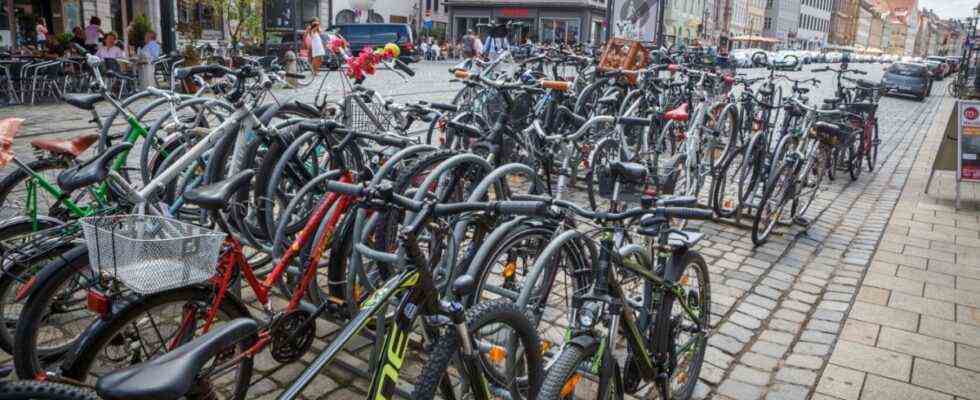The parking space regulation, which the citizens’ initiative “Fahrradstadt now” has agreed on with the city, could also be of interest to other municipalities from the point of view of the initiators: The city of Augsburg is committed to reducing the number of parking spaces for new buildings. On average, this should result in 30 to 40 percent fewer parking spaces for cars from 2022, but on average 70 percent more parking spaces for bicycles. “That is also climate protection,” says Arne Schäffler, board member of ADFC Augsburg.
Many municipalities have already given themselves the title of “Bicycle City”, including Augsburg years ago. From the perspective of cycling activists, little or nothing happened, which is why an alliance made up of the ADFC, “Fridays for Future” and the “Forum Augsburg livable” launched a referendum. There are similar initiatives in nine Bavarian cities, some municipalities have already adopted the goals of the citizens’ initiative and are working on implementation. The Augsburg city government made up of the CSU and the Greens has now decided to conclude a twelve-page contract under public law with the cycling activists. “A referendum costs a lot of money that is better invested in specific projects,” says Mayor Eva Weber (CSU).
It is an unusual solution that Augsburg is going for here. The initiators justify their decision not to pursue the request in favor of the contract with the vague formulations that would be legally permissible in a decision alone. In the negotiations on the contract, they were able to get the city to commit to much more specific commitments: Not only will fewer parking spaces be built, 550 existing parking spaces will be eliminated near the city center. Some Tempo 50 streets will be converted to Tempo 30 – at least in sections. The patency of cycle paths is improved.
Wherever intersections are being built or rebuilt, the city creates suitable lines of sight for cyclists and ensures that vehicles can only turn slowly in order to avoid accidents. The city is also setting up a deficiency app that cyclists can use to direct criticism or suggestions for improvement to the city in a short way, and there will be an annual progress report on the status of improvements in bicycle traffic. The city of Augsburg is creating six new administrative positions for the project: The amount earmarked in the budget for cycling will be increased in annual steps by a total of seven million euros until 2025. “In terms of budget, this means prioritizing cycling,” says Mayor Weber.
According to the ADFC Bayern, this is an attitude that too few municipalities in the Free State still show. In Bayreuth, a cycling decision was declared inadmissible by the city council. Munich, Nuremberg, Rosenheim, Regensburg and Erlangen have also come to an agreement with the initiators of the local citizens’ initiative – but in many places there are too few staff and cycling projects are generally given low priority. “The ever-growing cycling decision-making movement in Bavaria and throughout Germany is an expression of the growing dissatisfaction of cyclists with the local cycling infrastructure,” says the ADFC. It is a success that so many citizens come together in different cities to promote cycling. However, the projects would now have to be put into practice.
This is exactly where the mayor of Augsburg thinks that there is a problem. She knows from other cities that once the request has been accepted, there will be a lot of discussion about its implementation. “I am a person who likes to be pragmatic,” says Eva Weber. “I want to put energy into projects, not into discussions.” The more specific the agreements are, the better the implementation will be. The initiators of the request point out that the contract is binding for five years – a positive referendum would have been legally binding for the city for only one year.
The cycling activists in Augsburg collected more than 15,000 signatures. Much more than would have been necessary – despite the pandemic and lockdowns. Other petitions for citizens had to give up because of Corona. The contract, which the city council is supposed to approve in July, is now “the framework for climate-friendly mobility” that will make it easier for people to switch from cars to bicycles, says Almut Schwenke from the ADFC. Verena von Mutius-Bartholy, parliamentary group leader of the local Greens, also speaks of the “traffic turnaround in Augsburg”.
And CSU parliamentary group leader Leo Dietz says: “The expansion of bicycle traffic is an important building block on the way to our goal of positioning Augsburg as the most climate-friendly metropolis in Bavaria.”

